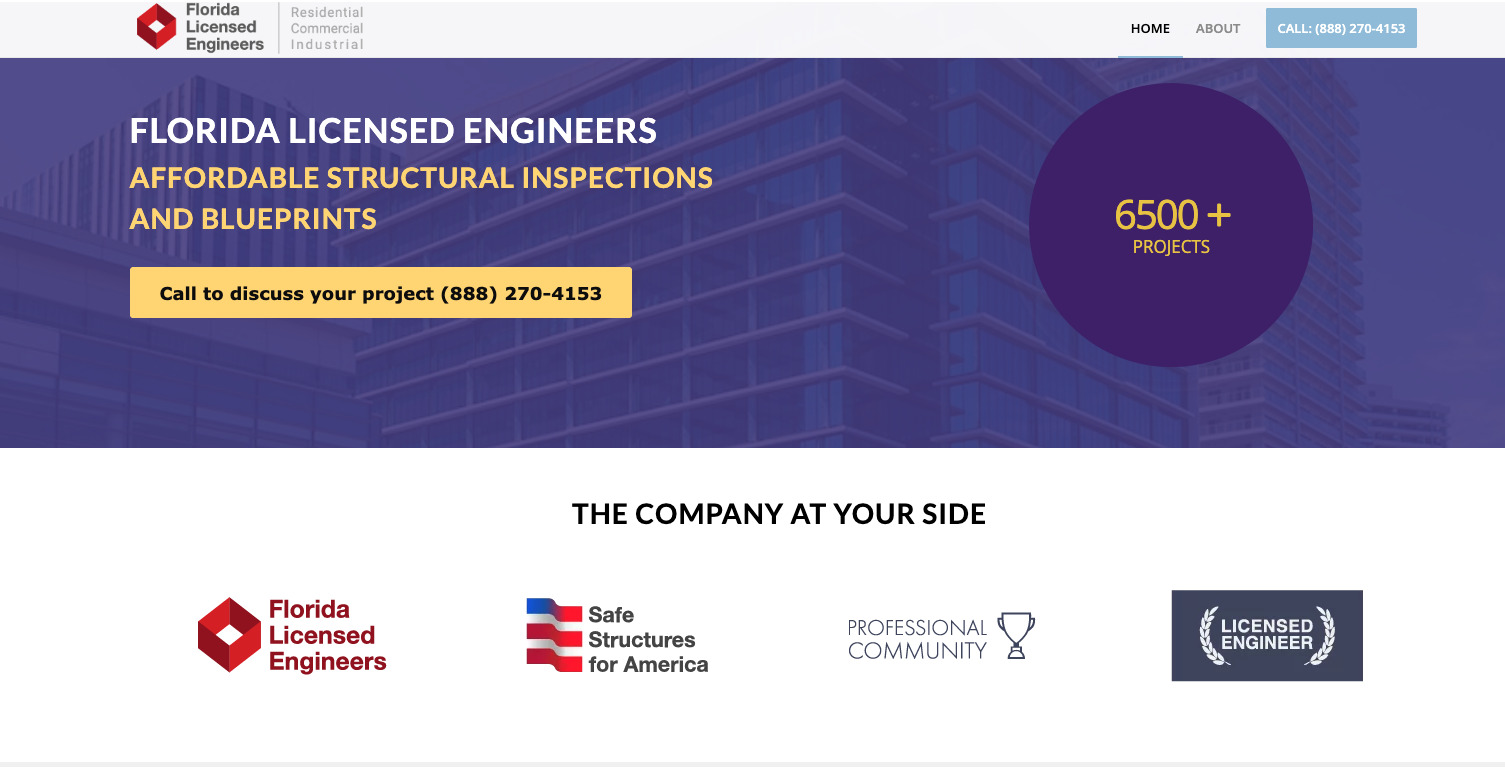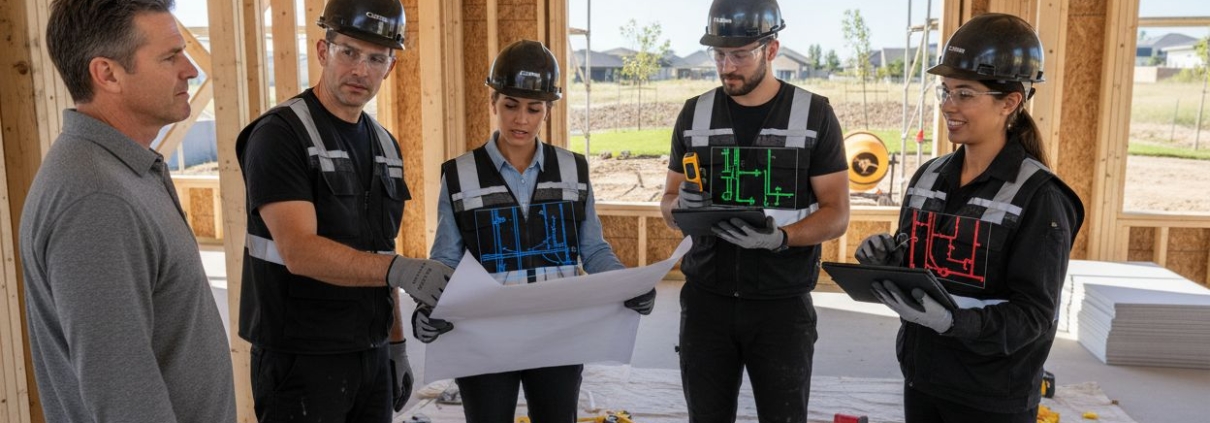Residential Engineering: Complete Guide to Its Role
Around 80 percent of people in the United States live in homes shaped by residential engineering decisions. Every safe foundation, smart energy system, and efficient water supply relies on skilled planning from experts in this field. Understanding what residential engineering covers can help homeowners, buyers, and builders make smarter choices about comfort, safety, and long-term value in any living space.
Key Takeaways
| Point | Details |
|---|---|
| Integration of Disciplines | Residential engineering combines mechanical, electrical, and plumbing expertise to create safe and functional living environments. |
| Continuous Improvement | Engineers assess and enhance residential structures for energy efficiency, technological integration, and long-term durability post-construction. |
| Regulatory Compliance | Adhering to local and national building codes is crucial for ensuring safety and legal compliance in residential projects. |
| Proactive Risk Management | Effective project management and thorough planning are essential to mitigate financial risks and avoid common pitfalls in residential engineering. |
Table of Contents
- Defining Residential Engineering And Its Scope
- Types Of Residential Engineering Services
- Key Processes In Residential Engineering Projects
- Legal And Safety Considerations In Residential Projects
- Costs, Risks, And Common Mistakes To Avoid
Defining Residential Engineering And Its Scope
Residential engineering is a specialized field of engineering that focuses on designing, planning, and maintaining residential structures and their internal systems. According to research from architectural engineering studies, this discipline applies diverse engineering principles to create safe, functional, and comfortable living environments. Learn more about our residential engineering services.
At its core, residential engineering integrates multiple technical disciplines including mechanical, electrical, and plumbing (MEP) systems. As defined by building services engineering research, these professionals ensure indoor environments are not just structurally sound, but also environmentally efficient and technologically equipped. Key responsibilities include:
- Designing HVAC systems for optimal temperature control
- Planning electrical infrastructure
- Developing sanitary and water management solutions
- Implementing building automation technologies
- Ensuring compliance with safety and building codes
The scope of residential engineering extends beyond initial construction. Engineers continually assess and improve residential spaces, considering factors like energy efficiency, technological integration, and long-term structural integrity. Their work requires a comprehensive understanding of architectural design, material science, environmental systems, and regulatory standards—transforming technical knowledge into livable, sustainable residential solutions.
Types Of Residential Engineering Services
Residential engineering services encompass a comprehensive range of technical disciplines designed to create safe, functional, and efficient living environments. According to industry research, these services can be broadly categorized into structural, geotechnical, civil, mechanical, and electrical domains explore our residential engineering solutions.
Structural and Geotechnical Services
Structural engineering focuses on the fundamental integrity of residential buildings. These services include:
- Designing foundations using reinforced concrete, steel, or timber framing
- Creating retaining and shoring walls
- Conducting site classification assessments
- Providing foundation recommendations

- Analyzing soil and groundwater conditions
Mechanical and Electrical Services
According to specialized research, mechanical and electrical (M+E) services are crucial in modern residential engineering. These comprehensive services include:
- HVAC system design and optimization
- Plumbing and drainage system planning
- Electrical infrastructure design
- Smart home and building management system integration
- Safety system implementation (fire and CO detection)
- Renewable energy system planning
Civil engineering services further complement these efforts by addressing urban design challenges. These include stormwater management, on-site detention planning, hydraulic modeling, and water-sensitive urban design strategies. Each service is meticulously crafted to enhance residential spaces’ functionality, safety, and environmental sustainability.
Here’s a summary of major residential engineering service types and their key focus areas:
| Service Type | Main Focus Areas | Example Tasks |
|---|---|---|
| Structural & Geotechnical | Building integrity Foundation stability |
Foundation design Soil analysis |
| Mechanical & Electrical | HVAC & energy systems Smart technology |
HVAC optimization Smart system integration |
| Civil | Site management Water & urban design |
Stormwater management Hydraulic modeling |
Key Processes In Residential Engineering Projects
Residential engineering projects require a sophisticated, integrated approach that coordinates multiple technical disciplines to transform architectural vision into functional living spaces. Learn more about our comprehensive engineering process, these projects demand meticulous planning and execution across various critical stages.
Multidisciplinary Coordination
According to research on engineering development approaches, successful residential projects rely on an integrated multidisciplinary strategy. This process involves seamless collaboration between:
- Civil engineering experts
- Structural engineering specialists
- Mechanical system designers
- Electrical infrastructure planners
- Environmental sustainability consultants
Mechanical, Electrical, and Plumbing (MEP) Design
A critical process in residential engineering is the comprehensive MEP design. As specialized research indicates, this involves detailed planning of mechanical, electrical, and plumbing systems with key focus areas:
- Performance optimization
- Precise cost estimation
- Comprehensive system documentation
- Strategic construction planning
- Long-term operational efficiency
These interconnected processes prioritize value engineering, proactive risk mitigation, strict regulatory compliance, and sustainable design principles.
Engineers meticulously analyze each project’s unique requirements, ensuring that residential spaces are not just structurally sound, but also technologically advanced, energy-efficient, and tailored to modern living standards.
Legal And Safety Considerations In Residential Projects
Residential engineering projects involve complex legal and safety requirements that extend far beyond basic construction practices. Explore our comprehensive safety compliance services, these considerations are critical to protecting homeowners, contractors, and communities from potential risks and legal complications.
Regulatory Compliance Framework
According to research on building regulations, residential projects must adhere to strict legal standards. Key regulatory aspects include:
- Obtaining necessary building permits
- Complying with local and national building codes
- Ensuring structural integrity and safety standards
- Meeting environmental and zoning regulations
- Implementing proper certification processes
Hazard Prevention and Risk Management
Research highlights several critical safety considerations that homeowners and contractors must carefully navigate:
- Avoiding unauthorized structural modifications
- Preventing removal of load-bearing walls
- Professionally managing hazardous material removal
- Conducting thorough safety assessments
- Implementing proper documentation and inspection protocols
Engineers play a pivotal role in mitigating potential risks by providing expert guidance, conducting comprehensive safety assessments, and ensuring that residential projects meet all legal requirements. This proactive approach prevents costly mistakes, potential legal penalties, and ensures the long-term safety and integrity of residential structures.
![]()
Costs, Risks, And Common Mistakes To Avoid
Residential engineering projects involve complex financial and technical challenges that can quickly derail even the most carefully planned developments. Discover our expert project management strategies to mitigate potential pitfalls and ensure successful project completion.
Financial Planning and Cost Management
According to residential construction estimating research, critical cost-related mistakes frequently emerge during project planning. Homeowners and contractors must be vigilant about:
- Accurately estimating material costs
- Accounting for site-specific conditions
- Calculating precise labor expenses
- Including comprehensive permit and compliance fees
- Establishing a robust contingency fund (typically 10-20% of total budget)
Risk Mitigation and Quality Control
Research highlights several common risks that can compromise residential engineering projects:
- Inadequate site preparation
- Using substandard building materials
- Overlooking critical building code requirements
- Skipping essential inspection processes
- Rushing project timelines without proper planning
Successful residential engineering demands a proactive approach. By implementing thorough planning, maintaining rigorous quality control, and working with experienced professionals, project stakeholders can significantly reduce financial risks and ensure the long-term integrity and performance of residential structures.
Ready to Solve Your Residential Engineering Challenges?
Navigating the complexities of residential engineering often means facing tough decisions about safety, compliance, and cost. From structural design to MEP planning and risk management, one mistake can lead to delays or unexpected expenses. If you are looking for reliable solutions tailored to your needs, explore our wide range of engineering services. Discover how our expertise in inspections, permits, drainage, and forensic reports can safeguard your project at every stage.

Do not let avoidable risks set your project back. Experience the peace of mind that comes from working with dedicated specialists committed to your residential goals. Take the next step by visiting Florida Licensed Engineers to request a consultation or learn more about our unmatched residential solutions. The right support is just one click away. Start building your safer and smarter home today.
Frequently Asked Questions
What is residential engineering?
Residential engineering is a specialized field that focuses on designing, planning, and maintaining residential structures and their internal systems, ensuring they are safe, functional, and comfortable.
What types of services are included in residential engineering?
Residential engineering services include structural, geotechnical, mechanical, and electrical engineering, as well as civil engineering services focused on urban design and safety systems.
How do regulatory compliance and safety considerations impact residential projects?
Regulatory compliance ensures that residential projects meet local and national building codes, while safety considerations protect homeowners and contractors by preventing hazards during construction.
What are common risks to avoid in residential engineering projects?
Common risks include inadequate site preparation, substandard building materials, and overlooking building code requirements. Proper planning and quality control are essential to mitigate these risks.




